Best Lat Pulldown Bars of 2024 | BarBend (original) (raw)
We receive free products and receive commissions through our links. See disclosures page.
Lat pulldown bars are important tools for athletes looking to build their back. Lat pulldown bars come in a variety of shapes, designs, weights, lengths, and grips. The one commonality they all share is the ability to attach to a pulldown machine to target the lats, rear delts, rotator cuffs, biceps, and forearms.
When choosing the best pulldown bar, it’s important to find the right kind for you to properly target the correct muscles. It’s not uncommon for pulldown bars to be used improperly during a workout due to an athlete employing a grip that hinders their movement. So let’s get a grip and pull down our top picks.
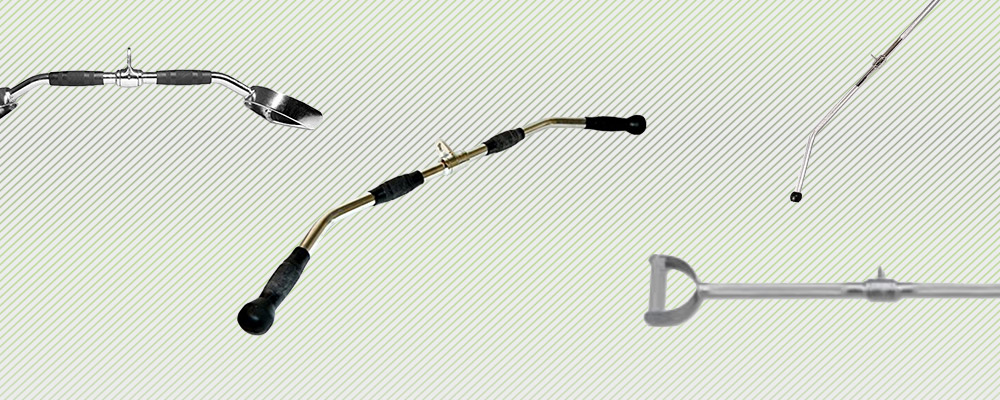
Editor’s Pick
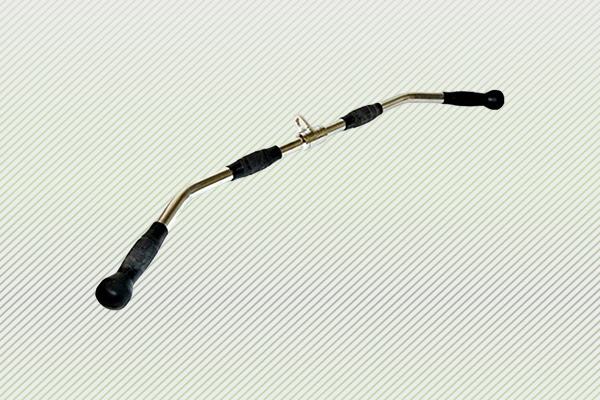
CAP Barbell Deluxe LAT Bar Cable Attachment with Rubber Handgrips
Pros:
- Two sets of rubber grips.
- Lightweight compared to most options on the market.
- Great for shorter athletes or athletes who prefer a narrower grip.
Cons:
- Arrives with a light oil coating to prevent rusting during shipment that may need to be washed off.
- Slightly more expensive than comparable options.
CAP Barbell Deluxe LAT Bar Cable Attachment with Rubber Handgrips
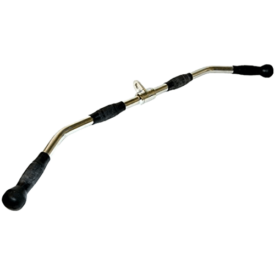
The CAP Barbell Deluxe LAT Bar is thirty-eight inches long and weighs just over six pounds. The bar has two different sets of rubber grips: towards the center of the bar for narrow grips and on the ends of the bar. The bar bends on each side, has a revolving hanger to attach to a pulldown machine, and a chrome finish.
Contender
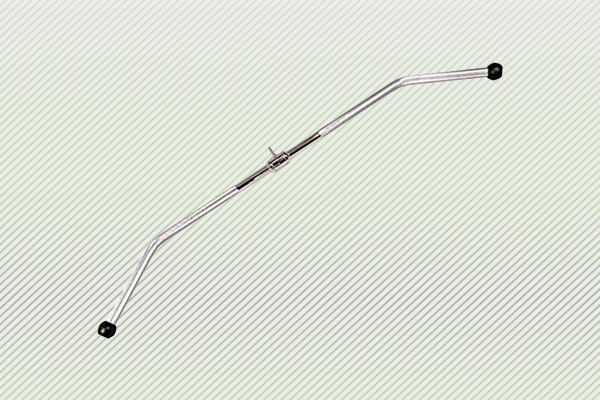
CAP Barbell LAT Pull Machine Bar
Pros:
- At forty-eight inches in length, it’s great for taller lifters or lifters with wider wing spans.
- Has a 320lb capacity.
- The straight section of the bar is thirty-two inches long.
Cons:
- May be unruly for lifters with a shorter wingspan.
- Lifters hands may be marked with a silver hew if used with sweaty palms.
- Likely to rust if used in a humid environment.
CAP Barbell LAT Pull Machine Bar
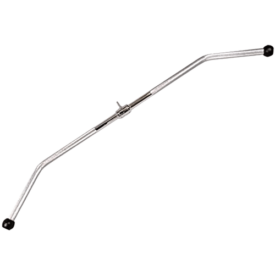
The CAP Barbell LAT Pull Machine Bar is forty-eight inches long and weighs eleven pounds. Most of the bar is knurled to provide a non-slip grip. It has a revolving hanger for full range of motion when attached to pulldown machines and a chrome finish. It is made of solid steel.
Best with D-Handles
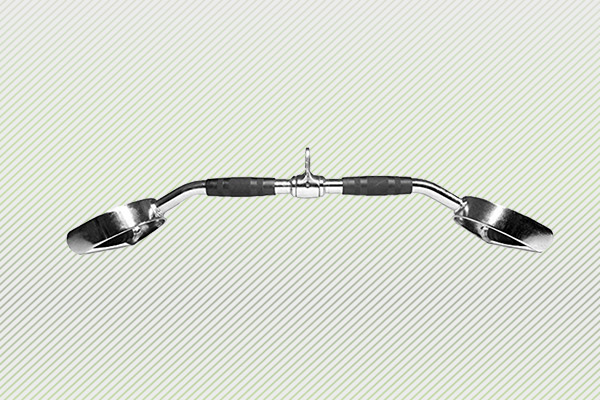
Titan Fitness Chrome Lat Bar Pro Duty D Handle
Pros:
- D-handles allow for a hammer grip when performing a pulldown or row.
- The D-handles have rubber grips.
- Straight section of the bar is twelve inches long.
Cons:
- The rubber grips may move along the handles over time.
- Short length of the bar may be uncomfortable for larger athletes.
Titan Fitness Chrome Lat Bar Pro Duty D Handle
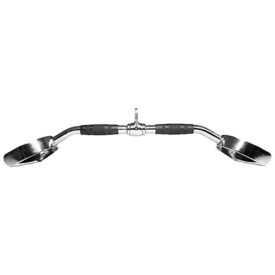
The Titan Fitness Chrome Lat Bar is just under twenty-eight inches in length and weighs ten pounds. It is made of heavy duty steel with a chrome finish and the bar bends placing the D-handles on an angle when used on a pulldown machine. There are narrow rubber grips close to the revolving hanger in the center of the bar.
Contender with D-Handles
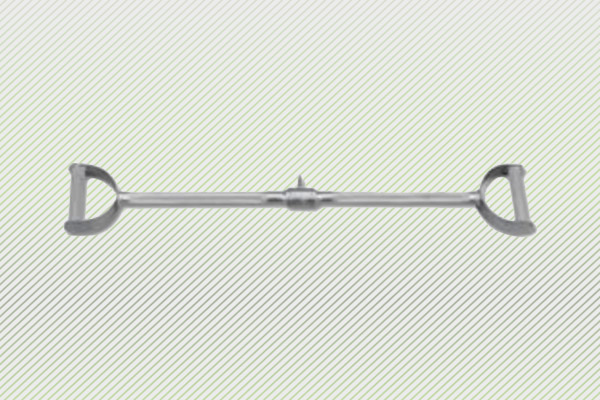
Champion Pro-Style Lat Bar
Pros:
- The bar is straight from end to end.
- Both the bar and the D-handles are knurled.
- Heavier than most bars on the market.
- May make behind-the-head pulldowns more comfortable for the wrists.
Cons:
- May be uncomfortable for athletes who dislike a rough textured grip.
- The bar may not be balanced lengthwise on each side of the rotating hanger.
Champion Pro-Style Lat Bar
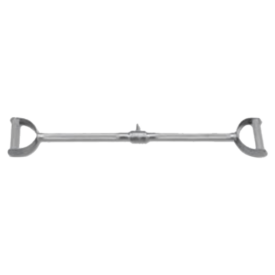
The Champion Pro-Style Lat Bar is made of steel and measures thirty-four inches long. Each end of the bar is equipped with a D-handle. There is a small hole in the rotating hanger for oil to ensure the bar does not squeak.
Methodology
Length
The length of the correct pulldown bar for an athlete does have some subjectivity, but more often than not, the most appropriate pulldown bar will be the one that does not require the athlete’s grip to be too wide (unless specifically aiming to do wide-grip pulldowns). Most proper pulldown grips will be slightly wider than shoulder width despite many pulldown bars allowing for grips far wider. If you acquire a bar that is too long, it can be unruly to work with during a workout. If you acquire a bar too narrow, it can be uncomfortable to perform pulldowns. It is possible to find pulldown bars available from under thirty inches to almost fifty inches in length.
Shape
The main difference in shape for most pulldown bars is if they are either straight from end to end or if they bend slightly on each side. The bend is primarily to aid grip as it can be uncomfortable for the wrists to remain straight as grip gets wider. Ideally, when performing a lat pulldown, the athlete is pulling from the elbow and imagining the hands as hooks holding the bar. The bends on a pulldown bar better allow for during a wide grip as the wrists can remain perpendicular to the bar.
Grip
The grips of pulldown bars will usually consist of the knurling directly on the bar, a rubber or padded grip around the bar, or a handle attached to the bar (think D-handles). The benefits of each vary and which is likely best for you will depend on a few factors. The first being how rough a grip you can tolerate when lifting. If you prefer a grip easier on your palms, then steering towards the rubber or padded grips is the way to go. If a rougher texture against your hands doesn’t bother you, sticking to the bars that simply employ knurling will be sufficient.
Wrapping Up
Anyone aiming to build their back and isolate their lats and rear delts is making a strong choice investing in a pulldown bar. Know which kind of grip you prefer and the proper length and shape best suited for you and your V-taper may not be all that far away.
FAQs
What is a lat pulldown?
A lat pulldown is a back exercise usually done on a lat pulldown machine. It involves an athlete pulling an overhead bar attached to the machine down towards their collarbone.
What muscles do lat pulldowns target?
Lat pulldowns are primarily employed to target the latissimus dorsi on the back. Lat pulldowns can also help built the rear deltoids of the shoulder, biceps, and forearms.

Phil is a native New Yorker passionate about storytelling, bodybuilding, and game design. He holds a BFA from Syracuse University.